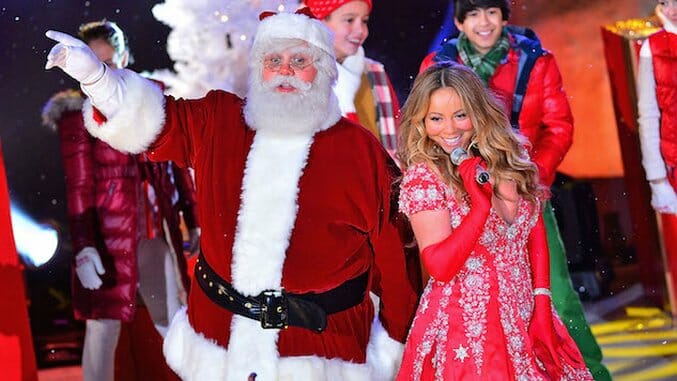Mariah Carey and the Holiday Haunting: Merry Christmas at 30
Carey and Walter Afanasieff started working together in 1990, and Merry Christmas saw the pairing at the peak of their commercial power.
Photo by James Devaney / Getty Images
It’s not even November yet, and I’m already being inundated with Christmas kitsch every time I dare to leave the apartment. Grafton Street, Dublin’s humming hive of commercial activity, is already bedecked with Christmas lights and massive chandeliers—though at least they have the good sense not to light them yet. Shops are selling dainty snowflake garlands and tasteful felt stockings to hang above the fireplace with care. This early, blatant cash grab is enough to turn even the most festive among us into cold-hearted Scrooges—especially when you’re a massive Halloween fan like myself.
However, I have to admit, I haven’t heard those ominous twinkling opening notes yet, that bright-eyed, terrifyingly cheerful harbinger of the Christmas season: Mariah Carey’s unstoppable hit “All I Want for Christmas Is You.” This is an extra special year for the holiday mainstay as well, since Carey’s album Merry Christmas—the record on which that song first appeared—turned 30 on October 28. Yes, we’ve had three decades with a track that, depending on your perspective, is either a miracle or a monstrosity.
1994 was a hell of a year by any measure. On January 6 (what a cursed date), an attacker clubbed Olympian Nancy Kerrigan’s knee, and the ensuing legal fallout essentially ended Tonya Harding’s ice skating career. In March, a little baby boy named Justin Bieber opened his eyes for the first time. Friends premiered and Pulp Fiction hit theaters, both destined to become college dorm poster fixtures. And before kids could even break out their Halloween costumes, Mariah Carey released an album that would transform her from a pop artist to a global superstar.
Merry Christmas followed 1993’s Music Box, which is by no means a mind-blowing album; it’s less than 50 minutes of bland ‘90s pop and R&B that shows off Carey’s thoroughly impressive vocals but not much else. From noticeably tinny synth to an unabashed sappiness, this is a record that sounds dated from pretty much the first note. Carey has one of the most distinctive voices of our time, but the songwriting here is so trope-y that she somehow slips into anonymity. And yet, this is one of the best-selling albums ever, with a staggering 28 million copies sold. Cliches endure because they’re based on kernels of truth, and therefore it’s no wonder that Music Box spoke to so many listeners. There’s a spark of genius in the collaboration between Carey and co-writer Walter Afanasieff that came to full fruition on the holiday record: the realization that expertly executed simplicity—both in terms of lyrics and melody—wins out above all else.
For those unfamiliar with Afanasieff, this is a man whose stamp is all across ‘90s music pop culture. Afanasieff produced “My Heart Will Go On” of Titanic fame as well as Disney’s Beauty and the Beast (1991) and Aladdin (1992) soundtracks. He also produced and arranged Hercules‘ standout song, “Go the Distance.” Afanasieff is a two-time Grammy winner and has written for the likes of Savage Garden, Kenny G, Santana, Michael Bolton, Josh Groban, Vanessa Hudgens, New Kids on the Block, Andrea Bocelli, Barbra Streisand and many more. That’s not to mention the legends he’s played with over the years, including Aretha Franklin, Lionel Richie, Patti LaBelle and Natalie Cole. And yes, he has a songwriting credit on “She Bangs” by Ricky Martin.
-

-

-

-

-

-

-

-

-

-

-

-

-

-

-

-

-

-

-

-

-

-

-

-

-

-

-

-

-

-

-

-

-

-

-

-

-

-

-

-








































